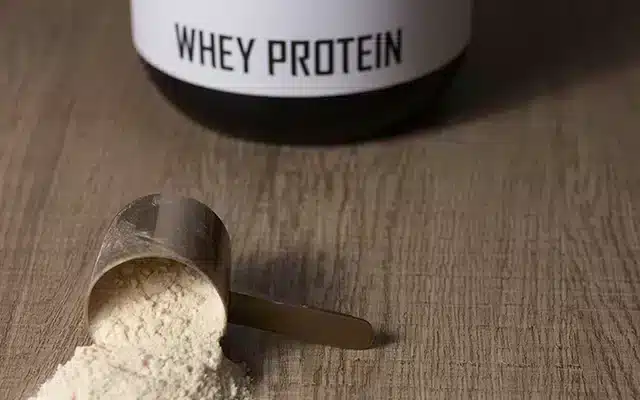Does whey protein cause acne? Well, maybe. But if you are experiencing acne outbreaks after drinking whey protein, you are not alone! In fact, a lot of people have asked us what they should do to prevent this from happening. So today, let’s talk about the cause and how you can effectively manage your acne while maintaining that protein intake.
Why does whey protein cause acne outbreaks in some people?
First of all, it’s important to know that consuming whey protein may contribute to acne only in some people. As you may already know, whey protein is a dairy-based protein supplement that is commonly used by athletes and bodybuilders to help build muscle mass.
One possible explanation for the link between whey protein and acne is that whey protein contains hormones and growth factors that can increase the production of sebum, the oily substance that clogs pores and contributes to acne. Additionally, whey protein supplements contain high levels of amino acids, such as arginine and leucine, which can also contribute to the development of acne. Another factor to consider is that the chocolate flavour in most whey protein powders may increase the risk of acne outbreaks as well, albiet the evidence appearing to be inconclusive.
Since acne development is caused by many factors, such as genetics, diet, and lifestyle, not everybody will experience this when drinking whey protein.
What should I do to prevent acne from drinking whey protein?
If you are concerned about the potential for whey protein to contribute to acne, there are several alternative protein sources you can consider. Here are a few options:
- Plant-based protein powders: There are many plant-based protein powders available on the market, such as pea protein, soy protein, hemp protein, and brown rice protein. These options can be a good choice for those who are lactose intolerant or who prefer a vegan or vegetarian diet.
- Choosing vanilla or unflavoured protein powders instead of chocolate as this avoids the controversy surrounding chocolate.
- Egg white protein powder: Egg white protein powder is a good alternative to whey protein as it is lactose-free and does not contain the hormones or growth factors that may contribute to acne.
- Fish or poultry: Lean sources of protein such as chicken, turkey, or fish can be a good alternative to protein powders. They are also a good source of essential nutrients such as zinc, which can help improve skin health, although they may be less cost-effective.
- Nuts and seeds: Nuts and seeds are a good source of protein and healthy fats. You can add them to your meals or snacks, or use nut butter as a spread.
In addition to changing your protein source, there are other steps you can take to help prevent acne:
- Practice good skincare: Use a gentle cleanser to remove dirt and oil from your skin. Avoid scrubbing or using harsh products that can irritate your skin and make acne worse.
- Stay hydrated: Drink plenty of water to help flush toxins from your body and keep your skin hydrated.
- Eat a balanced diet: Focus on eating a balanced diet with plenty of fruits, vegetables, and whole grains. Avoid sugary and processed foods that can contribute to inflammation and acne.
- Manage stress: Stress can trigger acne breakouts, so it’s important to find ways to manage stress, such as exercise, meditation, or deep breathing.
The Bottom Line:
There is no good evidence indicating whether whey protein actually causes acne or not. However, if it does bother you, you probably should choose a different protein source to meet your dietary requirements.
If your acne situation is not under control after all this, you may want to speak to a healthcare provider as this may indicate an underlying problem.

